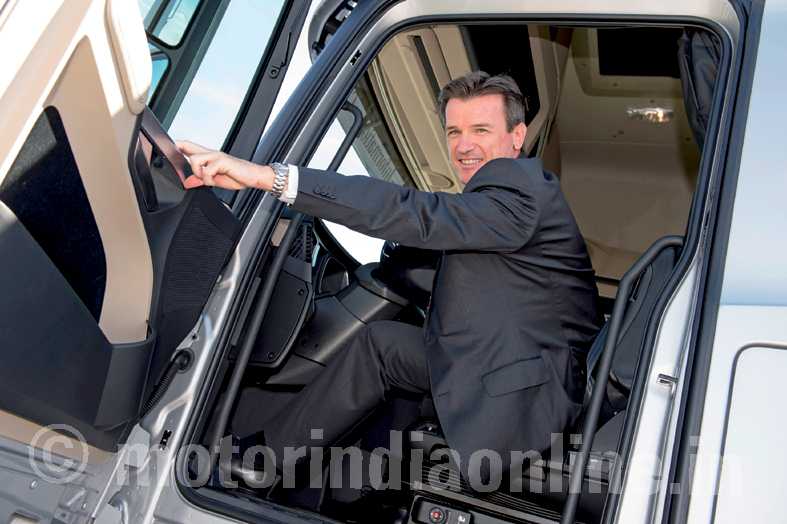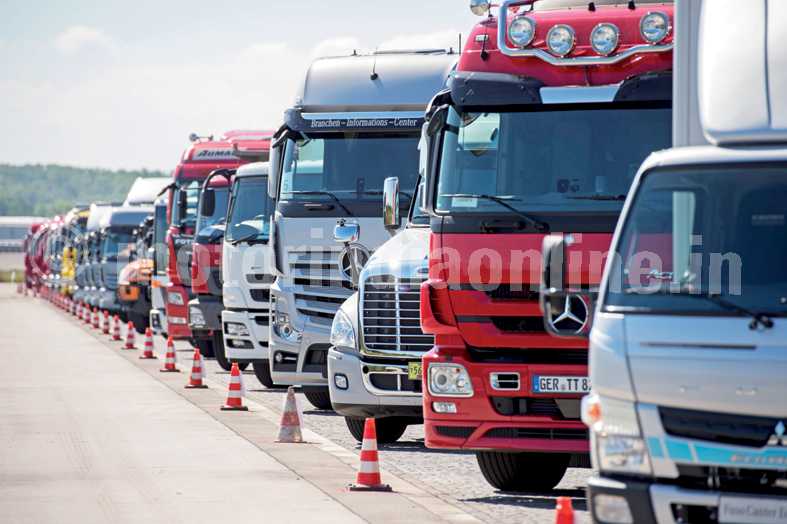– Dr. Wolfgang Bernhard, Daimler Board of Management member responsible for commercial vehicles

Dr. Wolfgang Bernhard is positive about his first 90 days as the Daimler Board member responsible for commercial vehicles. At a press event in the Mercedes-Benz Wörth plant, Dr. Bernhard assessed the results of his first 90 days in office in his new role.
“I experienced a very steep learning curve these past three months — not only behind the steering wheel of a truck but, more importantly, during my many visits and discussions in the global Daimler Trucks division. I’m very impressed and thrilled to see how skilled, dedicated, and passionate our employees worldwide are,” said Bernhard who will soon receive his truck driver’s licence.
“Daimler Trucks’ valuable brands, global positioning, products and technologies that are right for their markets, and huge potential for additional economies of scale provide it with ideal conditions for defending and strengthening its leading position”, he added.
Development of sales and markets
The global economic situation remains problematic – a state of affairs that is of course reflected in the commercial vehicle markets. The global markets were correspondingly difficult in the first six months of 2013, but the situation will probably ease slightly in the second half of the year. The European market is showing signs of bottoming out, while North America is stabilizing. Japan has approved a new economic stimulus program, and the market is recovering in Brazil thanks to the continuation of favorable financing conditions for commercial vehicles.
These market developments are reflected in Daimler Trucks’ sales. The division’s sales totalled 180,119 units through May 2013 – that’s only three per cent lower than in the same period of last year (185,107). Daimler Trucks substantially increased sales in Brazil to 15,823 units (Jan.-May 2012: 10,313). At 21,157 units, the division sold as many trucks in Western Europe as in the same period of last year (22,633). The situation was similar in NAFTA, where sales were 53,259 units (54,615), and in Japan where sales totalled 14,248 units (Jan.-May 2012: 14,960). In India, the division has sold around 2,700 BharatBenz vehicles this year alone. Despite a difficult market environment, the brand thus took the fourth place in India’s ranking of new truck registrations through May.
Daimler Trucks had received orders for 212,000 vehicles worldwide by the end of May, an increase of 19 per cent over what was achieved in the same period last year. In addition to the rise in incoming orders, the increase in market share in many regions also underscores Daimler Trucks’ positive business development. The company was able to maintain its strong market position. In NAFTA, the division was helped by the new Cascadia Evolution, which greatly impresses customers with its outstanding fuel efficiency. In Western Europe, the company became the first manufacturer to offer a complete range of Euro VI-compliant vehicles. In Indonesia, almost half of the trucks are now from Fuso.
“The increase in market share and incoming orders shows that we have the right products in the right markets,” said Bernhard.
Daimler Trucks has no intention to rest on its laurels. Its ambitious return on sales target of eight per cent over the business cycle is still valid, as are the sales targets of selling more than five lakh units by 2015 and seven lakh units by 2020. In order to reach these ambitious targets, the division will systematically forge ahead with the initiatives of the Daimler Trucks #1 program. Here the focus will be on implementing growth initiatives and efficiency-boosting measures.
“The past three months have taught me that Daimler Trucks is very well positioned,” said Bernhard. “At the same time, we can’t afford to slacken our pace if we want to use this basis to deliver even better results. This way we will achieve our goal of becoming the leading global truck manufacturer in every respect.”
In the future, the division plans to go beyond the current initiatives in its efforts to identify and exploit additional growth opportunities in new and established markets. To this end, Daimler Trucks has launched the new integrated Asia Business Model for its operations in Asia. The model aim is to exploit as much growth and synergy potential as possible in relation to procurement, production, sales and the product range. Among other things, the division plans to produce the robust Fuso brand trucks in Chennai. These trucks will subsequently be exported to markets in Asia and Africa. The first batch was delivered to customers in Sri Lanka at the end of May. Another focal area is the aftersales business with services and parts.
At the same time, the division will vigorously push forward with its existing efficiency-boosting programs. Among other things, a global module strategy is helping Daimler Trucks achieve economies of scale. As powertrains exemplify, the globally operating commercial vehicle manufacturer can greatly benefit from shared parts and the associated economies of scale. The Daimler Trucks business units have accorded top priority for this issue and are vigorously working on additional projects that will improve the division’s global parts-sharing strategy. As a result, up to 70 per cent of the triad trucks could be made of parts from a global modular system in the future. Analogous to the steps taken for powertrains, the division created an organizational unit for the vehicle modular system (chassis, cab, and mechatronic system) on June 1.

Technological leadership
A basic precondition for Daimler Trucks’ future market success is its sustained leadership in relation to products and technologies that are customized to meet the needs of each specific market. In the Shaping Future Transportation initiative, Daimler Trucks has brought together all of the technologies and services that make commercial vehicles safer, more economical, and more environmentally friendly.
No matter whether Daimler Trucks’ customers are from the triad markets, emerging markets, or elsewhere, their most important considerations are practicality and an optimal total cost of ownership.
Continuous improvement of combustion engines, development of profitable hybrid vehicles such as the Fuso Canter Eco Hybrid, creation of new concepts for natural gas drives and the improvement in aerodynamics in an optimized truck-trailer combination are just a few of the many measures that are being implemented by Daimler Trucks.